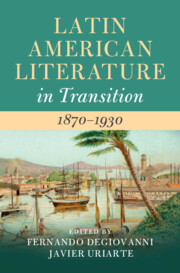Book contents
- Latin American Literature in Transition 1870–1930
- Latin American Literature in Transition
- Latin American Literature in Transition 1870–1930
- Copyright page
- Contents
- Figures
- Contributors
- Acknowledgments
- Introduction
- Part I Commodities
- Part II Networks
- Part III Uprisings
- Part IV Connectors
- Chapter 16 Money
- Chapter 17 Bodies
- Chapter 18 Travel
- Chapter 19 War
- Chapter 20 Science
- Chapter 21 Visual Technologies
- Part V Cities
- Index
- References
Chapter 17 - Bodies
from Part IV - Connectors
Published online by Cambridge University Press: 14 January 2023
- Latin American Literature in Transition 1870–1930
- Latin American Literature in Transition
- Latin American Literature in Transition 1870–1930
- Copyright page
- Contents
- Figures
- Contributors
- Acknowledgments
- Introduction
- Part I Commodities
- Part II Networks
- Part III Uprisings
- Part IV Connectors
- Chapter 16 Money
- Chapter 17 Bodies
- Chapter 18 Travel
- Chapter 19 War
- Chapter 20 Science
- Chapter 21 Visual Technologies
- Part V Cities
- Index
- References
Summary
This chapter examines the complex itineraries of two influential Latin American queer writers – Mexican playwright and official chronicler of Mexico City Salvador Novo (1904–1974) and Chilean intellectual and diplomat Augusto D’Halmar (1882–1950) – to expose how their bodies undergo significant transformations in order to assert new sensibilities and relationships in the economy and productivity of travel. Novo and D’Halmar utilize their bodies to respond to the heteronormative pact between the state and the lettered city, and also to map a larger world based on unexpected connections, transformations, and new readings of the common archive. Through Eastern clothing and intense fevers, cosmetic prostheses and flamboyant behavior, these writers disorganize the hierarchies that dominate the hegemonic narratives of sex. In the process, they attempt to achieve a sort of material autonomy – the chance to regulate their own bodily matter – and thus forge new paths for Latin American writers.
Keywords
- Type
- Chapter
- Information
- Latin American Literature in Transition 1870–1930 , pp. 252 - 266Publisher: Cambridge University PressPrint publication year: 2022



